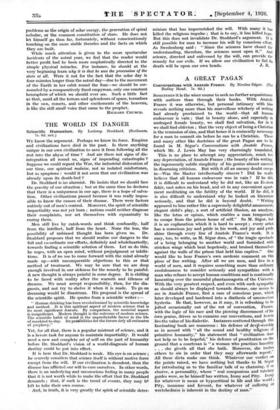A GREAT PAGAN
Conversations with Anatole France. By Nicolas Segur. Bodley Head. 7s. 6d.) SOMETIMES it is the wiser course to seek no further acquaintance with authors than through their books. With Anatole France it was otherwise, but personal intimacy with him reveals nothing more than his marvellous witchery of writing had already proclaimed to the world—that all human endeavour is vain ; that in beauty alone, and especially in undraped female beauty, we shall find salvation, for in it we shall find oblivion ; that the very object of being a Christian is the remission of sins, and that hence it is eminently necessary for a man to commit sin before he can be a Christian. These and many other like doctrines of the great Pagan are to be found in M. Segues Conversations with Anatole France, which Mr. J. Lewis May has very charmingly translated, This is no place to attempt any appreciation, much less any depreciation, of Anatole France ; the beauty of his writing. the ingenuously subtle simplicity of his genius almost succeed in disarming criticism. But with it all an uneasy doubt creels in—Was the Master intellectually sincere ? Did he really believe that all human endeavour was in vain ? If he did, it is difficult to understand why he did not, like an Esstem fakir, cast ashes on his head, ancl sit in any convenient apart. meat meditating on the futility of the world. If he did, it is also difficult to understand why he looked on literature seriously, and that he did is beyond doubt. "Writing appeared to him rather like a supremely delightful amusement, elegant child's play, a sort of artificial illusion, an anodyne, like the lotus or opium, which enables a man .temporarily to escape from the prison house of self." So M. Segur, but it is an explanation which it is hard to accept ; every artist has a conscious joy and pride in his work, and joy and pride shine through every line of Anatole France's work. It is easy, too, to write, as M. Segur does, of "the :tragic spectacle of a being belonging to another world and furnished with stricken wings which beat hopelessly, and bruised themselves against the walls of the prison that held him captive." One would like to hear France's own sardonic .comment, on this piece of fine _writing. After all we are men, and live in a world of men, and it requires something more than ordinary credulousness to consider seriously and sympathize with a man who refuses to accept human conditions and is continually lamenting over the mournful phantasmagoria of the Universe. With the very greatest respect, and even with such sympathy as should always be displayed towards disease, one seems to see in Anatole France, first a case of conscious pose, which later developed and hardened into a diathesis of unconscious hysteria. Be that, however, as it may, it is refreshing to be jolted occasionally out of the rut of convention, France. with the logic of his race and the piercing discernment of his Own genius, drives us to examine our conventions, and herein lies the value of his dialectic. Instances scattered through this fascinating book are numerous : his defence of devil-worship as in accord with "all the sound and healthy religions of primitive humanity," his statement that "civilization does not help us to be hopeful," his defence of prostitution on the ground that a courtesan is "a woman who practises humility . . . she giveth all that she hath. Moreover, she incites others to sin in order that they may afterwards repent' All these dicta make one think. Whatever our verdict ne the points raised, we have nothing but thanks to M. segur for introducing us to the familiar talk of so charming, if so elusive, a personality, whose "real companions and tutelary guides were, as he himself has written, Irony and Pity. Irony for whatever is mean or hypocritical in life and the world ; Pity, immense and fervent, for whatever of suffering or wretchedness is inherent in the destiny of man."


































 Previous page
Previous page